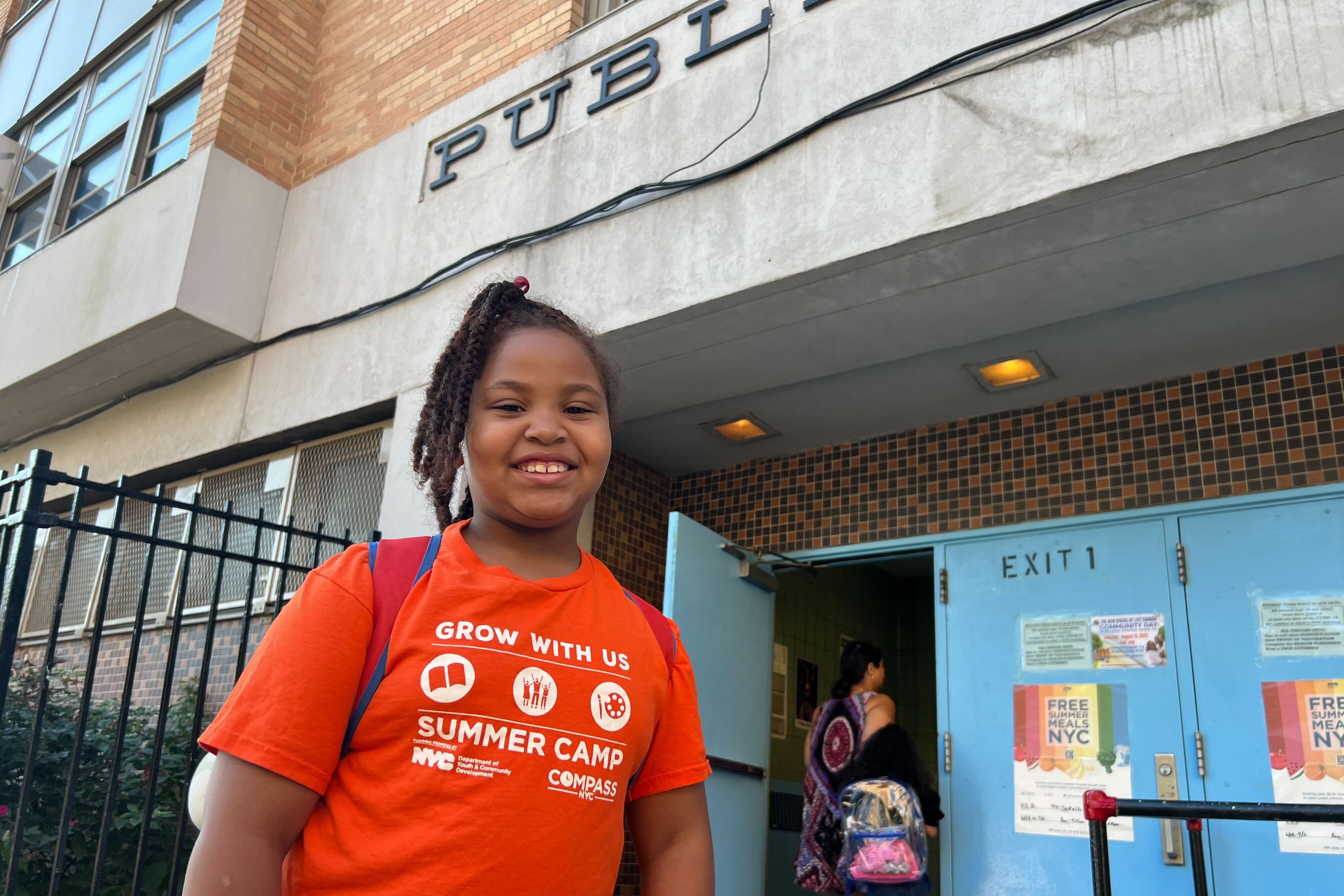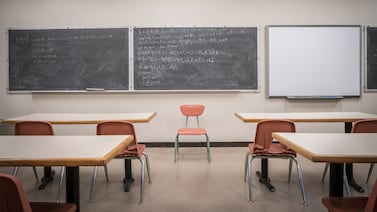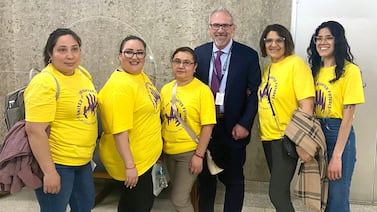Summer Rising, New York City’s massive effort to rebrand summer school as something fun and educational, has a lesson for the regular school year: Children really like outdoor and hands-on activities.
One 7-year-old’s favorite thing was a trip to a bouncy house, while another loved having a barbecue. One 10-year-old was excited to learn how to jump rope for double Dutch; another enjoyed playing hide-and-seek, running through the hallways, ducking into classrooms. Painting, drawing, and bracelet-making were high on the list, according to students at several Summer Rising sites in Brooklyn. (Though bracelet-making also had its detractors.) Playing games on computers or classroom smartboards also got top marks.
The city offered 110,000 spots for elementary and middle school students in its $350 million Summer Rising program, up from last year’s 98,000. Propped up by federal dollars, it is the second year in a row that New York City offered the program free to any student, not just those who needed academic help.
Last summer, the program, which combines academics and enrichments, was seen as a crucial bridge into the new school year for students who had been out of classrooms for prolonged periods due to the pandemic. This summer, seats were snatched up days after applications opened. Education department officials said they are working with the Adams administration and City Council in hopes of continuing the program. Educators see it as an important defense against “summer slide,” when students regress academically during the break.
Nationwide, summer programs were bolstered through the Biden administration’s federal relief funds, setting aside $122 billion to school districts through the 2024-25 school year to help with reopening campuses and aiding academic recovery. An analysis from Future Ed estimated that districts will spend more than $6 billion of that money on summer and after-school programs.
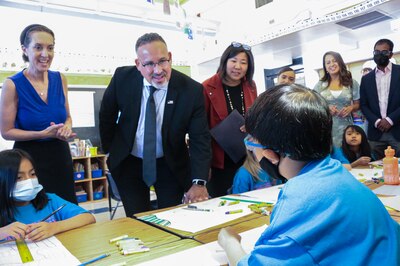
U.S. Secretary of Education Miguel Cardona, who visited P.S. 7 in Queens this week to see Summer Rising in action, lauded the program as a way to continue to help children reacclimate to the classroom.
“They’re ready for the school year. They’re full of confidence,” he said of the students in the program. “They have more social skills.”
He also touted how schools were working with community-based organizations, with teachers mainly responsible for the academic portion in the morning, and staffers from community organizations leading the afternoon activities such as trips, art activities, and backyard games.
‘We’re better prepared’
Lovanna Abbott, a site director for the Coalition For Hispanic Family Services, which partnered with P.S. 7, said her team focused on the arts and literacy this summer through its theme, “Around the World in 34 days.” The children have been learning about different cultures and countries, channeling their newfound knowledge into artwork posted around the school.
“They had their own little passports, so they can see where they’ve gone and what they’ve learned about,” Abbott said.
Compared to last summer’s rocky rollout, she felt that things went more smoothly this year though others reported some initial snafus.
“We’re better prepared. The teachers have more support,” Abbott said. “We know what we need to get for the students.”
In response to feedback from families, this year’s enrollment systems prioritized students in temporary housing and students with disabilities, officials said. More than 11,000 students in temporary housing and over 32,000 students with disabilities signed up for the program.
But for some of these students, who required transportation, issues remained. The education department provided yellow school buses for students with disabilities and children living in shelters, but buses were not available after 3 p.m. even though enrichment programming runs until 6 p.m., and only until Aug. 12, before this week’s enrichment-only days.
The city provided prepaid ride-sharing services for the home trip after the enrichment program, but parents had to accompany their children. Though the city covered the roundtrip for parents, it could still be a struggle for them time-wise. As of last week, Summer Rising families took roughly 7,000 prepaid rides, officials said.
“Students living in shelter and students with disabilities who rely on bus service shouldn’t have to leave the program hours earlier than their peers,” said Randi Levine, from Advocates for Children.
Parents reported some other bumps. Janet Agard, who on Thursday morning dropped off her 6-year-old granddaughter, at P.S. 235 in East Flatbush, said some trips were canceled because of lack of busing, and one swim trip was nixed because the pool had no lifeguards.
But overall, many families were elated to send their children to the free program.
“I really sincerely feel like kids lose a lot over the summer,” said Brooklyn mom Jamie Braden. “And teachers spend time just trying to get them back up to speed. So kids who have been academically motivated during the summer, either maintain what they had or gain a little, and nothing is lost, which I feel is really important.”
Kids sound off
Amirah Young, 7, who is entering second grade next month at P.S. 81 in Bedford-Stuyvesant, was a bit nervous to attend the program. Now, she can rattle off her summer’s highlights: getting wet at the park down the street, making the bracelet now on her wrist, drawing, watching a movie, and having an ice cream party.
“I feel excited, happy and brave,” she said, “because at the beginning I was scared, but I started to get braver.”
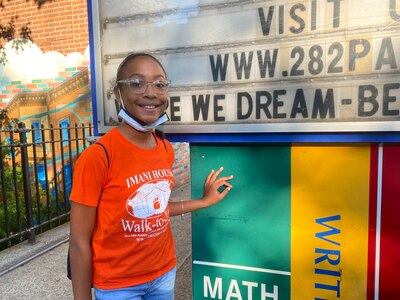
Mia Mitchell, a 10–year-old going into sixth grade, lucked out by having her same teacher from the past year for summer school at P.S. 282 in Brooklyn’s Park Slope. In the morning, she and her peers would start off writing in their journals before doing reading and math. Then they would continue learning outside before lunch before doing other outdoor activities like double Dutch.
Her least favorite thing was having to go back inside for rain or other reasons.
“I liked being outside,” she said.
Seven-year-old Zayd Olivera, a rising third grader at P.S. 235, liked that Summer Rising had no homework and was happiest when visiting a bouncy house with the program.
But Zayd admitted he would rather be spending his days playing the popular video game Fortnite.
“I don’t like school in general,” Zayd said.
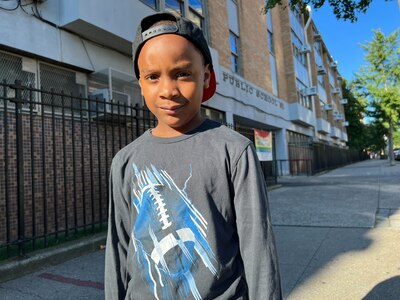
Other students seemed ready for the school year to start on Sept. 8. Six-year-old Christian Garrison said he was feeling “good” about entering second grade at P.S. 81 after making some headway on beginner books.
“Then, I can learn how to read,” Garrison said.
Alex Zimmerman is a reporter for Chalkbeat New York, covering NYC public schools. Contact Alex at azimmerman@chalkbeat.org.
Reema Amin is a reporter covering New York City schools with a focus on state policy and English language learners. Contact Reema at ramin@chalkbeat.org.
Amy Zimmer is the bureau chief for Chalkbeat New York. Contact Amy at azimmer@chalkbeat.org.


